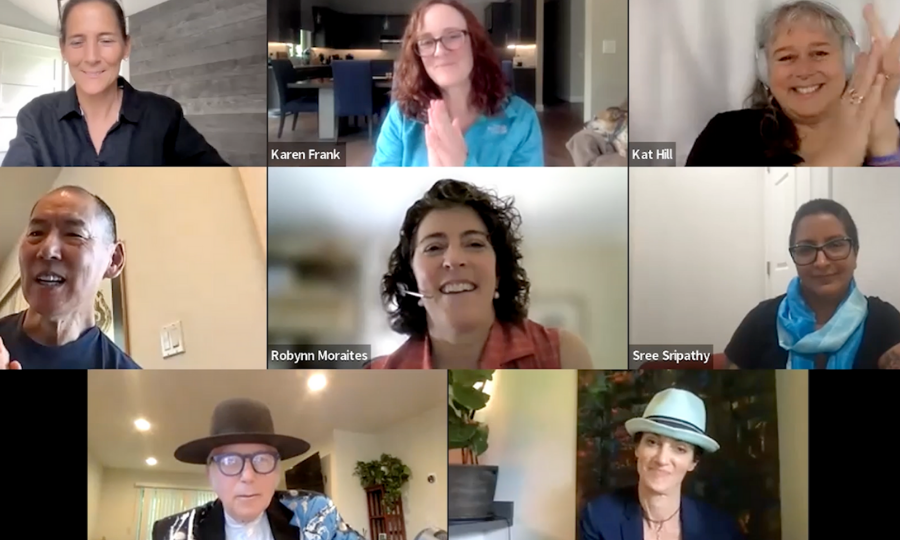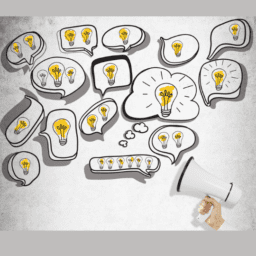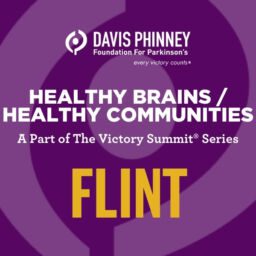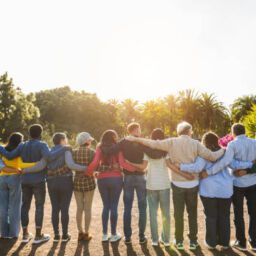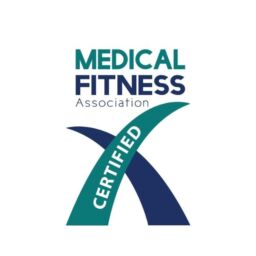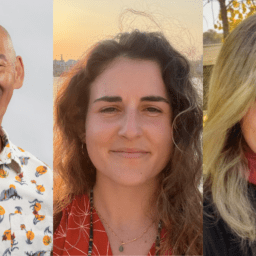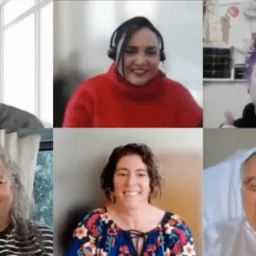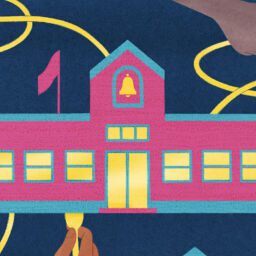In this webinar, our YOPD Council members discuss how understanding your mental and physical limitations with Parkinson’s can improve your quality of life.
Watch the video and read the show notes below.
The YOPD Council: Reaching Your Limit
You can read the transcript below or download it here.
Melani Dizon (Director of Education, Davis Phinney Foundation):
Hi everybody. And welcome to the Davis Phinney Foundation May YOPD Council. We’re really happy to be here with you today. We’re gonna do some quick introductions of our panel members in case you are new to us. So right now, I just want each person I’m gonna call on you, I just want you to say, tell us your name, tell us how long you’ve been living with Parkinson’s and maybe one fun fact about you. Karen you’re muted. Sorry. I should have picked somebody that was not muted.
Karen Frank (Ambassador, YOPD Council Leader, YOPD Women’s Council Leader, Davis Phinney Foundation):
Hi, I’m Karen. Let’s see. I am 51. I was diagnosed with Parkinson’s at 47 and one fun fact is I absolutely love gardening and cooking with my vegetables that I grow.
Melani Dizon:
Love it. Thanks. Kat.
Kat Hill (Ambassador, YOPD Council Leader, YOPD Women’s Council Leader, Davis Phinney Foundation):
Hi everybody. I’m Kat Hill. I am 55. I was diagnosed at 48 and I’m coming to live from an Airstream trailer.
Melani Dizon:
New, a brand-new trailer. Yay.
Kat Hill:
A brand-new Airstream trailer.
Melani Dizon: Robynn.
Robynn Moraites (YOPD Council Leader, Davis Phinney Foundation):
Hey, I’m Robynn Moraites. I am 52. I was diagnosed correctly at 46 and a fun fact of me is I was a clown performing at children’s birthday parties when I was in high school.
Melani Dizon:
That is fun fact. Kevin.
Kevin Kwok (Board of Directors member, YOPD Council Leader, Davis Phinney Foundation): Hi everyone. I’m calling in today from a different location. I’m here at my parents’ house in Walnut Creek, California. I’ve been living with Parkinson since the age of 48.
Melani Dizon:
Thank you, Kevin. Heather.
Heather Kennedy (YOPD Council Leader, YOPD Women’s Council Leader, Davis Phinney Foundation):
My name is Heather. I live in Northern California. I’m a Virgo. I like long walks on the beach. I mean…
Melani Dizon:
Wrong panel… wrong panel.
Heather Kennedy:
My fun fact is that I do sight gags sometimes not on purpose. Oh yeah, I was diagnosed about 12 years ago.
Melani Dizon: Great. Sree.
Sree Sripathy (Ambassador, YOPD Council Leader, Davis Phinney Foundation):
My name is Sree and I don’t know how long I’ve been living with Parkinson’s, but I’ve had symptoms for eight years and fun fact about me is this scarf, it’s not a fact, it’s just a note. This scarf was given to me almost 15 years ago and it’s the first time I’m wearing it. My friend bought it for me, my friend, Deborah in Italy. And so, I’m debuting it here for all of you.
Melani Dizon:
Wow. That is, that’s special. It’s a good day for it. It’s a good day for it. Alright, Nenad. Here’s what I would love. Nenad, if you could tell us who you are, how long you’ve been living with Parkinson’s, a fun fact about you, and then get right into the music.
Nenad Bach (Founder, Ping Pong Parkinson):
My name is Nenad Bach. I have been diagnosed in 2010 and I love asparagus.
Melani Dizon: Asparagus. All right.
Nenad Bach:
If I had another life, I would never walk straight. All the things I love to do. Other people love to hate. Wear my shoes on my ears. My hat on my feet. Park the car in the kitchen. Take a bath in the street.
I love Ping Pong. I love bums. I love the Three Stooges and those crazy drums. I like lovers who don’t vote the same. And lying on my bed in the stars and the rain.
If I had another life, I would run, run, run. Run, run, run, have some fun…
but seriously, if I had another life, I would run for president, feed the pigeons in the park, never pay the rent. Heather Kennedy, secretary of state, declares money illegal, now wouldn’t that be great.
I love Ping Pong. I love bums. Anchovy pizza and those crazy drums. I like lovers who don’t vote the same. And lying on my bed in the stars and the rain, oh yeah.
Now, if I had another life, I would do it all again, run a movie from the middle, beginning at the end. Try to miss the target and win the biggest score. Tell my dad I love him, like I never did before.
I love Ping Pong. I love bums. I love the honeymooners and those crazy drums. I like lovers who don’t vote the same. And talking to my father in the stars and the rain, oh yeah.
If I had another life. If I had another life. If I had another life. If I had another life. There you go.
Kevin Kwok:
Alright, that was awesome.
Mel Dizon:
That was fabulous.
Nenad Bach:
It was fun to watch you. I couldn’t take eyes off you, I almost forgot the lyrics.
Heather Kennedy:
We can’t sit still, what do we have Parkinson’s or something?
Nenad Bach:
Seven years ago, I could not play this song because I could not play syncopation you see.
Melani Dizon:
Yeah. So, Nenad, tell that story. We’re talking about limits today and we’re gonna talk about a lot of different things. We’re gonna kind of take things by category, but I’d love for you to tell some of the people here on this panel and our community that have not met you, and don’t know a little bit about your story. I’m gonna share a lot of those links for everybody. But tell us what happened with your guitar playing.
Nenad Bach:
Well in 2015, I was diagnosed in 2010, in 2015, I stopped performing live because I could not, just my fingers would just be stuck with the strings. Syncopation is very demanding on the brain. I love that Heather is smiling from the first second.
Heather Kennedy: I love music.
Nenad Bach:
I’m distracted, completely.
Melani Dizon:
We got a Heather crush going on.
Karen Frank: Heather crush.
Nenad Bach:
And my fingers would be stuck with the strings. Like, I just could not play. So, I started to by coincidence, a friend of mine invited me to a table tennis club in Weschester, called Westchester table tennis center. Owner is Will Shortz, crossword puzzle editor for New York times. And I went to Boston the next day and I felt much better. So, okay. It’s gotta be accidental, you know, I don’t know. So next week we went again, this friend of mine and I, and next day, I felt better immediately. So, I said there must be something there. So, I increased to two to three times a week. And then after three to four months, I could play guitar again. And since then, I’m performing live. And so, if it helped me, I thought it could help other people. So, I organized Ping Pong Parkinson, not for profits, in 2017. And as of today we have over 140 chapters around the world. So.
Melani Dizon:
That’s amazing. And I’m gonna share a link with y’all. I don’t want you to share it right now, because you’re gonna be way too tempted to go watch the video. It’s so fun. So, I’ll share it a little bit later. But also, I just found out today, fun fact, you may already know this, but that there’s gonna be a ping pong room at the World Parkinson’s Congress next year. Cannot wait for that. Very cool. And Nenad, why don’t you, isn’t there a big, there’s like a big Parkinson’s tell us about the one in Texas coming up in July.
Nenad Bach:
Yeah. This is something first time in history. I’ll go on my smaller chair.
Melani Dizon: Yeah.
Nenad Bach:
This is what is happening to give you like overview. People, we who have Parkinson, we have no access to para games of any kind in any sport, we’re completely excluded from para olympics, para games, we have no classification. So, I’m trying to get this classification for five years already and unsuccessfully. So, finally USATT, which is the United States Association of Table Tennis, they allow us to participate in not just para games, but regular games. So regular championship of United States, we will have a special we will be a category and we will get the main stage also at the end of the tournament. So, that’s something that we, I want people who play, the level of playing is not important, but of course, if you play better, it’s better for us. But if you have desire to play ping pong, please come to Texas in July, July 15, 16th, 17th, and participate in the, and you may become a champion. You never know.
Melani Dizon:
You never know. Yeah. And Kat, hey, maybe in your Airstream, you’ll be finding your way around there. So, anybody who’s out and about traveling and wants to go out there, definitely check out the Ping Pong Parkinson again, I will send all of those links. So, Nenad is going to be our bonus panel member today. Very happy about that. And I’m gonna turn it over to Robynn. We’re gonna go through a bunch of different categories and talk about it, ask questions, share your experiences, that kind of thing. So, Robynn, take it away.
Robynn Moraites:
Thanks Mel. So, we were talking about this before the, before we sort of joined lives and we realized this all comes under the category of self-awareness and growth, that we’re all learning about ourselves as we have, you know, symptoms and as things progress or stay static for a little while. And so, we don’t want this to necessarily be a downer because some of the limits that we all identified also come with some built in solutions and adjustments along the way. And Parkinson’s is one of those diseases that the concept of agency is very important. You become an expert in your own disease management and what your own limits are and what might be okay for me might not be okay for Karen and vice versa. You really can’t go by anybody else’s experience. You really have to learn for yourself what you’re willing to spend your energy on and how you’re willing to spend your energy.
So, I wanna start with a category that’s just a very kind of obvious one. And we’re gonna talk about kind of physical, physical endurance. It can involve sports or something like that. And I’ll kick it off just with an example for my own life. And then we’ll just sort of call on some panelists. Last year, we did a bike trip where we rode our bikes from Pittsburgh, Pennsylvania to DC, down the gap trail and the CNO Canal Towpath trail. And it’s about a 300-mile bike ride. And I booked an electric assist bike and the outfitter got it wrong and brought me a regular bike and on the first day, so I was gonna be able to switch out my bike on the second day, but for the first day, I had a regular bike and we were maintaining a pretty fast pace on a trail, kind of going about 14 to 15 miles per hour on a trail, which is pretty fast.
That’s kind of 17, 18 on a road bike, I guess. And we got about three quarters of the first day was about 60 miles, and we got about three quarters of the way through, and I was cooked. I was cooked. And I told my partner, we had a last rest stop before the final 15 miles. And he said, well, we can go as slow as you need to go. And I started on, I got about a mile away from the rest stop. And I said to him, this isn’t about pace. Like I’m done. I’m really done. And I don’t, and I had enough experience from bike races in the past and big bike events where I pushed myself too hard and then I was destroyed, and this is the first day of a week-long trip. And I said, I need to conserve.
And so, I went back to the rest stop. I got a back for the last 15 miles and it was a good thing I did because those last 15 miles were straight up until the final couple miles down, but I didn’t overdo it. And I got my electric assist bike, and I was able to ride the next day. But I will say I learned that very much the hard way. Because I had a lot of peer pressure in my marriage to keep up and keep going. So, who else is, Kevin, I’m gonna call on you because I know you mentioned something about sports.
Kevin Kwok: Am I unmuted?
Robynn Moraites: Yes.
Kevin Kwok:
Yeah. You know, I had an episode, I mean constantly we’re drawing boundaries where we say, if we go beyond, we could get hurt. But you know, I came off a situation about a month ago, where I fell and I fractured a rib from skiing, I was skiing at the time, you know, and everyone told me, Kevin, you have no business to be on the slope. And I started thinking to myself, you know, I don’t, I disagree. Because for me, the mantra that I use is I don’t fear falling, but I fear the day when people do not let me fall. And that sort of, I still live by that. Now I broke the rule. The rule was never hurt yourself in any endeavor. And I set myself back for about five weeks of doing nothing and that was really bad, but I wouldn’t trade that fall for anything because the joy that I had getting there is the joy that I’m gonna have going forward. I’m just gonna be a little more careful.
Robynn Moraites:
Excellent, excellent point. Who else has a story with physical limits and endurance, Kat.
Kat Hill:
I’ll jump in. My work required long, long hours and lots of 24-hour call shifts and was also a fairly physical job. So, for me, very early in the process, I was not doing well, managing my symptoms with that job. And, therefore, it was really physical and lack of sleep reasons why I left. It was a job that I could no longer do safely and effectively. So, the physical limitations for me rallied early and I was very, I wasn’t even formally diagnosed. I just had heard you probably have young onset, come back in six months and we’ll see. So, I think if I had a less physical job or a job that didn’t require so many long hours and up and down all times of the night, I would’ve enjoyed working longer, but I also, it was paramount for me to be able to keep my patients safe. And I learned that I felt better if I managed and accepted those limits earlier, I was able to manage my symptoms better, not working so many long hours, so it can be a trade- off.
Robynn Moraites:
Well, and you transition into an important topic. We’re talking about professional changes, and I don’t wanna pivot away from you Kat quite yet, while you kind of quit your day job, you didn’t stop working. And you’ve done a lot of things since that time. And so, if you could just share with everybody.
Kat Hill:
I think for me, being of service and staying connected to community and keeping my mind working has been really vital to my wellbeing overall. So, while I miss my career very much, I’ve been able to pivot, I’m gonna quote Kevin some, and I’ve learned to do things I never thought I’d do. I learned how to do a podcast and I’ve written a book and I’ve gotten involved in all these webinars. I learned how to use zoom. I’m learning how to use new noise, canceling headphones, and I’m in my maiden journey. So please forgive. I’m not much of a techie, but I’m trying to learn to be, right. So, and I’ve met wonderful people. And I think, you know, we kind of have a choice in the loss part and the loss is hard and we grieve it and it’s hard to pivot.
Sometimes we don’t wanna pivot. I wanted to deliver babies for a long time. I wanted to get my kids through college before I left work. It wasn’t part of my plan to get Parkinson’s. But it has brought me some richness and learning that maybe I have the ability to do many things. And who knows what I’ll pivot to next, you know, as limitations in one area, sort of like other doors will open, right.
Robynn Moraites: Other opportunities.
Kat Hill:
Yeah. So, living smaller now, mind you, we’re only a week into this Airstream journey, but I’m loving how small and easy everything is, in this small unit compared to our 3,400 square foot house. It may get old, but for right now it’s an adventure and I’m not sure we would’ve done it. We certainly would not have done it in our fifties. So had I not gotten Parkinson’s so, you know.
Robynn Moraites:
Thank you, Karen, I know you made a professional shift.
Karen Frank:
Yeah. I could relate very similarly to what you were talking about Kat, because our professions had similar physical requirements and mental and time requirements, but at the risk of transitioning topics a little but I felt compelled while you were talking, you know, I experienced all those things professionally that you did, Kat. Most recently my most profound and deeply, I learned a lot from the experience, was learning about my own limitations with my own mental health and wellbeing in terms of care taking for other people. I just recently had a really difficult experience where I just, I think being a nurse and maybe you can relate to this Kat or being in the helping professions, I’ve just structured my whole life around taking care of other people. And it’s very hard to sometimes turn that camera lens around on yourself and sometimes to have the same clarity of vision on your own life that you might have upon someone else’s.
And somebody said to me, a really good friend, said to me today, Karen, if someone else were describing what was going on in your life right now with your limitations to your own mental and physical health, what advice would you give them? And I could very clearly give that advice to someone else and then to give that self-advice back to myself and really had to admit, because I really hurt, you know, someone I deeply cared about, not knowing my own limitations, and you know, I listened to what you said, Kevin, about how to avoid this going into negative place for me, I’m gonna be really vulnerable here, and share with you guys that, you know, I’ve been in recovery, I’ve been sober for 13 years, you know, and I relapsed on medical marijuana.
That’s been really hard. You know, I’ve had my, I convinced myself that I was gonna be okay, you know what, I wasn’t. In my first episode of psychosis and my first episode of uncontrolled, you know, mania, I had, you know, was far from home when it happened, far from the people that love and care about me. I got stuck out of town somewhere and I really didn’t know how to get home and I really needed help. And it was really hard, and I had to know my own limitations and I never thought, you know, I almost didn’t come today. And I thought, no, no there’s value in sharing this. Cause it’s so fresh. They’re so fresh to me, you know…
Robynn Moraites:
Well, and Karen, you pointed out to me, all of our experiences can help someone wherever we are on the progression scale, whatever kinds of life experiences we’re having. I assure you there’s people in the listening audience who are having trouble with boundaries and focusing on themselves and taking care of themselves. And so, you’re not alone. And I’m really glad that you had the courage to share that.
Karen Frank:
Well, I can tell you as an advocate, when your very best friends, everybody you love on this planet, who you’re surrounded yourself by has Parkinson’s. I mean, I love you guys like you’re my sisters and brothers and it hurts to watch your friends suffering. And sometimes when you can’t hold that pain deeply, you know, I think sometimes we turn on ourselves. So, I mean, I don’t wanna go negative here, but this is just something that’s right before me. And it just happened, and so I wanna be, you know, with my community, I wanna be real. I wanna be a real person that you guys can relate to up here and not, you know, just, this is real, this is Parkinson’s in my world. So, I love you guys for being here in the audience and my community. I feel as much a part of this community as you know, I just feel blessed. So, thanks guys.
Robynn Moraites:
Thank you. Nenad. You’re on mute.
Nenad Bach:
Yes. First of all, thank you very much for having me here. I admire your panel because I’m following you. You’re like stars to me. When I see Kevin talking or anybody, what just Karen said, it’s very profound. And I usually say that we didn’t conquer with Ping Pong Parkinson, we didn’t conquer Parkinson, but we conquered the fear of Parkinson. So, it’s important not to have fear. And when they say disabled people like distinct ability, disability means distinct ability. So, we have some special ability because we can maybe, slowness is an advantage actually, because you can like, I enjoy the slowness. So, I’m trying to, maybe I will do TEDx, what is Parkinson? What is there not to like it or to love it?
You know, because in a sense, now I go to tram or bus in Europe and there are kids raising up, gave me seats. Like it never happened before, you know, so that somebody would stand up for me to sit. And of course, I don’t sit, but it’s a family. We had a world championship in New York in 2019 and people like, I call this class of 2019 and we are like brothers and sisters, and we support each other and love each other. And we talk almost on a daily basis. So, we are a big family and if we stick together, we will find even solution for this diagnosis, I don’t call this disease, I call this diagnosis because we don’t know what it is.
Robynn Moraites:
Thank you. And Heather, you brought up something really important in the chat of differentiating between the person and the symptoms. And I had read somewhere in a neuro palliative journal article that we take on, people with neurodegenerative conditions, tend to take it on as an identity where like cancer, a person with cancer doesn’t, you know, there’s all these different diseases, I have diabetes, I have, you know I don’t know, breast cancer, whatever, but we tend to take not just Parkinson’s, but neurodegenerative and it’s very hard for us to emotionally separate some of the symptoms from who we are cause it’s in our brain, so I think that’s a really important point. Do you have anything you wanna add to this particular, any of the categories that we’ve covered so far? Yeah. Heather.
Heather Kennedy:
I would love to add something to that comment. We talk a lot about the effects of a medication called an agonist. And of course, don’t worry, I won’t go too deep with this, of course, but it does cause some behaviors that are very separate from the person, so I would just ask that within our community and outside of our community, we continue to educate ourselves and others and gather information about this. So, we don’t shame people, so that we don’t make it into a moral issue. It is most certainly not a moral issue. This is chemical and it is the strongest impulse that we’re talking about here. It is dopamine. It is pleasure reward, which is tied in with our movement. So those meds that we need to move also change the pleasure reward centers. And we do deal with, you know, some pretty heavy mental things as we’ve been listening here, and everyone will have a stab at this. It’s not like Karen is unique. I think that everybody’s gonna go through something like the, you know, the cause and effect of a medication At the very least. So, nobody, you know, it’s an even playing field here, folks. That’s all I wanted to add.
Robynn Moraites:
Thank you. Sree. We haven’t heard from you yet. Do you have anything you wanna contribute to any of the categories that we’ve done so far?
Sree Sripathy:
I will, I’m not actually sure what categories we’ve done, I think we’ve covered a lot. I’ll just touch upon a few different things. So, in terms of limitations, driving at night, I do not like to drive at night so much anymore, and I have actually specific glasses that I have that help me to drive at night. It’s a little bit anxiety inducing for me, and that’s tough for me because I do like to go out to dinner with friends or all that sort of stuff, but you know what I’ve adapted and if it turns out that I’m no longer able to go out with friends at night, well, you know, what, if they care about me enough, they’ll pick me up or maybe I’ll take the bus or there’s Uber, or I just won’t go and I’ll save a lot of money. So, there’s that. In terms of physical limitations, I’ve encountered a lot in the sense that I, for work, for my current job, in tech, I have to type a lot. So, I used to type 120 words per minute, faster than that. Now I’m like at 40. So, it is…
Robynn Moraites: You’re a mere mortal.
Sree Sripathy:
I’m a mere mortal. Exactly. And honestly, one of the things that I was always known for is turning around work so quickly. Boom, boom, boom, I’d get it done. You know, intellectually, physically, everything. And now it takes me a little bit longer, but now instead of getting all my work done in four hours a day, like I used to, maybe it takes me six. So, maybe it takes me eight. Maybe it takes me nine. So that has been hard for me because I really relied on my skill with my fingers and typing in response to get me through the day. And it’s not like that anymore. In terms of work limitations, I still work full time and I’m actually leaving my full-time job in tech to do something that’s a little bit nuts, actually, that is more challenging physically, emotionally, mentally. I’m gonna be a photojournalist for a year. So, I applied for a fellowship, and I won a fellowship to be a local photojournalist visual storyteller for a local paper. Wow. And that’s what I’m gonna be doing. So, with my balance issues, swallowing issues, eye issues, speech issues, tremor, dystonia, I’m going for it. And yeah, there we are.
Robynn Moraites:
And Sree, let me ask you this, this is one, a theme that comes up again and again, did you feel more motivated to apply for this fellowship because of your condition? Is this something you would’ve maybe never done or put off, but for your Parkinson’s?
Sree Sripathy:
I don’t know how to respond to that in terms of the opportunity, but I can say there’s stuff that I’m doing now that I have not done before. I was talking to Kat about this recently offline. And I think I’m doing more now after diagnosis than I ever did before diagnosis. So, I’m pushing myself to do more and more, you know, I’m a Davis Phinney Ambassador. I started a project, or a collective called the Women’s Parkinson’s Project. Kat is a co-founder. I’ve taken on more work, more advocacy, I’m on webinars now. I would never have appeared on camera before Parkinson’s and now, or even at work on camera, and now I’m doing this with dystonia, with tremor, with a lot of dyskinesia, you know with speech issues, all of that stuff. Sometimes it’s very apparent. And just quickly, I don’t wanna take up a lot of time, when I was at a work conference last week for my current job, one of my colleagues commented to my boss and she only told me this a couple days later, she said, is there something we should know about Sree?
And my boss looked at her and said, she’s very open about it. You should ask her. She actually didn’t ask me, but my dyskinesia was off the chart that entire week. I basically had seven days of straight dyskinesia. I could not get it under control. And I thought, oh, nobody has noticed, I’m hiding it. This is amazing. You know, because how do you go up to somebody saying, you look like you’re a little weird, like nobody would, very few people would say that to you. And when I found out that it was noticed, at least by one person, it really took me aback and by surprise. And I was like, I don’t know how to process this, because with what Heather was saying earlier, and somebody else mentioned it, how do I separate myself from the disease?
And in that moment, I really couldn’t. So, I had a really rough night with that. And I came out of it and I did a photo project specifically around that thing where I photographed myself having dyskinesia and posted it online. And you know, my friends are like, wow, you posted that image. And I’m like, I did, because I need people to see this is a real thing. This is me having Parkinson’s. So, when I twitch and move, I mean, it is Parkinson’s, but it’s not, it is the medication, but it’s not so easy to separate the two. So yeah.
Robynn Moraites:
Well, and I wanna pick up on something, you said Sree about posting something on Facebook, I’m on the opposite end of the spectrum. I got off of Facebook because of my divorce and found that my quality of life improved in every area by just not being on social media, not even because of the politics or anything, just the attention divide that it required. And so, I opt to not be on social media because I feel so incredibly frazzled and drained when I’m on social media. So that’s a limit I’ve set for myself and related to that with the political spectrum and everything, and I don’t want to get into politics other than everyone is pissed off in a slingshot position all the time. And it’s not something that I can afford to do. And it’s a deliberate choice that I make not to get pissed off about everything that’s happening all over the world all the time.
Sree Sripathy:
I’ll just comment on that really quickly and then I’ll leave it for everybody else. So, I actually didn’t post it on Facebook. I posted it publicly on Instagram and I did 30 days of Parkinson’s during Parkinson’s awareness month. I didn’t tag anybody, and I didn’t tag any friends or use hashtags. So, it’s really meant for people who don’t know what Parkinson’s is to see what I go through every single day. So, every single day there was an image along with a poem or a spoken word, a prose thing. And that was to educate people like the people in my other circle. And I actually thrive on social media. So quite the opposite of you, but, you know, so I know my limits as well. So, when it comes to politics and social and stuff, I am vibrant and thriving on Twitter. And then when I need to take a break like I did yesterday, I’m like, I just log off the account, tell my friends, I’m taking a five-day break. Let me know if Jennifer Lopez and Ben Affleck break up. That’s big news to me, you know, big news and anything else. And I go about my life and then I log back on when I can.
Robynn Moraites: Kat. Thank you, Kat.
Kat Hill:
Yeah. Thanks Sree. That’s awesome. That’s awesome. I just wanted to share a tidbit that I learned early in my journey with Parkinson’s and that is, I didn’t wanna define my whole day by my symptoms. And so instead of saying I’m having a bad day or a good day, I used the word symptomatic and my family, and that’s partly a clinical term, Karen, I know you can relate to that, but instead of, I can be having a great day with lots of symptoms, or I could be having a great day without any symptoms. So, I’ve tried to use the definition of I’m feeling very symptomatic today, or you might notice that I’m very symptomatic and my hand is shaking today. Even with kiddos, I watch my niece who is three. She’s really like my third cousin twice removed or something, but niece for all purposes. And I explain it to her because I think it’s important for her to understand why my hand is shaking and that’s a symptom, but it doesn’t mean I’m doing badly or in pain or if I’m hurting, I say, you know, I’m having some pain, I think that’s symptomatic today or whatever. So just choosing our words even helps us frame it in our brains differently. So just a little food for thought. If you try changing your language a little bit and even Sree, telling your coworkers, maybe you’re right. I really am symptomatic today. That can happen sometimes with Parkinson’s. Maybe they’ll be more open to asking you about it.
Melani Dizon:
Yeah, I just wanted to say something real quick, because Colleen put a really interesting comment there and I think maybe y’all have some thoughts on it. I’m sure that you’ve probably experienced it in some way or another at some point. But she says when I refer to being symptomatic, my mom thinks I’m using PD as an excuse. What are, has anybody had that experience? Yes. Yes. Yes. Okay. Awesome. What are some things that you’ve used to communicate with other people when they’re, you know, think that you would be using… it’s like what? Who would use this? Okay. Heather.
Heather Kennedy:
We are pretending to be well, that’s why it’s so confusing. My friends saw me walking in the park when I just told her I couldn’t walk that day, which was true three hours before that. So, what people need to know about Parkinson’s is that it’s like a wave that’s just gonna come and go once you get far along, you know, you cannot make plans ahead of time. That’s just what I’m gonna say. I’ll speak for myself. I cannot make plans ahead of time. What would y’all say?
Robynn Moraites: Kevin.
Kevin Kwok:
Yeah, the same point, I’ve always said in my talks, when you have Parkinson’s, you don’t fake your disease, you fake your wellness.
Robynn Moraites:
Hmm. Excellent point. Sree. You raised your hand for that one too, I think.
Sree Sripathy:
I think I did. I’m not sure, but I’ll say it. I fake my illness when I don’t wanna meet certain people. Guys, I’m really having a rough day today. So, I use that to my advantage. My mom will say, you always have a backup plan for everything. You always have a meeting, or you always have an excuse. I’m like, great. And I have Parkinson’s, that’s my constant thing. But I think it’s very hard for people. Really quickly, I had my parents’ 50th anniversary recently and I helped coordinate it. I was up from 7:00 AM that day till 2:00 AM the next day, doing all of this stuff. And I had somebody come up to me and say, oh, well, you don’t even look like you have
Parkinson’s you actually didn’t have any issues. And on that day, I didn’t, with all of that stress. And I think part of it was, I was surrounded by family and friends who loved me, who all knew I had Parkinson’s and that, I think that connection, that touch really stabilized me. But then a couple days later, when I’m feeling drained and exhausted, they don’t understand.
And I think this is common for people who don’t have Parkinson’s or another type of disease like this MS, or anything else like that, that they are not able to really understand, how can you be up one minute and down the next minute? And even if you explain it to them, they still don’t get it. Because they visually see that you’re laughing, smiling, joking, and the next minute you’re in bed, like exhausted. And I do not know how to convey that message to them. I still don’t after all these years.
Robynn Moraites: Karen.
Karen Frank:
Yeah. I can so relate to how you’re describing it so aptly, Sree. I’ve realized that I don’t have to seek support from the same sources that I used to, because they don’t serve me anymore. Like some of my family, they just don’t get it. They don’t, you know, I don’t know if it’s just I just find it so much easier to call a friend with Parkinson’s or even just shoot a text real quick to one of my Parkinson’s peeps and just a smiley face back does the best for my day. Just to know they’re there. I mean, when I send Heather a Little smiley face in the morning in San Francisco, we may not even have an exchange, but I know she saw my smiley face and you know, I know that we’re interacting in our day somehow and it’s the smallest interaction, but it’s the hugest interaction. It’s the same, you know, it’s the same thing with all of you guys. I really feel that way. So.
Robynn Moraites:
Kat and then Nenad. Kat, you had your hand, do you wanna be acknowledged? Okay. Kat, then Nenad.
Kat Hill:
Yeah, I just think too, that just as we are learning about the disease, those around us are learning about it also. And you can provide information and resources for them and as they are ready, they will either choose or not choose to learn more about it. But I also think at some point we need to be honest with ourselves, that that isn’t always our responsibility, either. Our responsibility, we’re kind of back to being aware of ourselves, taking care of ourselves and what other people choose to take away or not take away, we can’t take that on. That really is not our responsibility. Except maybe for Sree who cracks me up. Makes excuses. I can only say that, because I’ve known Sree for a very, very long time and I’m giving her a bit of a hard time. So, I know you well Sree and so does your mom, it sounds like too.
Robynn Moraites: Nenad.
Nenad Bach:
So, we shouldn’t have expectations from others to understand because how do you explain that your hand is in your pocket, and you cannot take it out? Like, how do you explain that to a person who can button easily something? I do not expect anybody. My family also, they think they know, but they don’t.
Robynn Moraites: Right.
Nenad Bach:
You know, if we don’t expect that, it’s much easier.
Robynn Moraites:
Well, and this transitions into a perfect conversation about asking for help, knowing when you need to ask for help, how do you ask for help? Karen? Do you wanna go for it? Okay.
Karen Frank:
Yay. Yes. I was afraid to lean hard into my relationship for the first time. This has been, I mean, not that getting into a Parkinson’s diagnosis is not leaning hard into your relationship, because it certainly is. That’s a big whopper and losing your career at 47 and all kinds of other things, but to lean into it in a way where I was like really intimately vulnerable and emotional and say, I am hurting, I’m suffering, I’m using poor tools, you know? And I need people around me and I need to ask for specific things from my community and from my friends and from my husband. And that’s been wonderful to actually like have that soft place to land and to realize like I can trust my support systems when I need them, because I don’t always need them, but they’re there. And now that I need them, it’s okay to lean into them. And I, you know, I think that is really important for me personally.
Robynn Moraites: Excellent. Who else? Sree.
Sree Sripathy:
So, I hate asking for help unless I’m feeling really lazy and I’m like, mom, the orange juice, please get me some and she’ll just look at me and she’s like get off the couch, you know? But when I need help, I don’t, I mean fake help I like, but real help, it frustrates me. I get very irritated and frustrated with myself when I can’t open a grocery bag. When I can’t open a pill bottle, I tried for two days to open a little face cream tube, but those little things on it and I refused to ask for help. I’m like, I’m doing it on my own. And partly, it’s stubborn, but partly it’s scary to have to ask for help honestly. And then often when you ask for help, people give you help too much. I’m like, I don’t need help carrying groceries in, I can open the door by myself. So, I don’t wanna be that person that everyone, oh, look, she’s here. Here’s a chair for you, auntie. Here’s this cane for you. I’m like, if I ask for help, then that’s when I need it. But otherwise please don’t give it to me. Or if you see that I’m really extremely shaking, then tell me, but it’s a balance. And so, I still have a lot of emotional swings with that. I, you know, that’s something I still struggle with. Yeah.
Robynn Moraites:
Thank you. I have asked complete strangers for help on the street, especially at home Depot and lows with huge bags of mulch and I just play the weakling. It has nothing to do with my Parkinson’s. I say, hey, can I borrow your muscles? Can you just put this in the back of my car for me? Guys are like, yeah, happy to do it. So, I think also those of us from 12 step recovery are used to asking for help much more. It’s not something that scares me anymore. In fact, we almost have a saying, how can you tell the difference between an old timer and a newcomer? The old timer is much more quick to pick up the phone and ask for help when something’s not going right. And say to someone, how do you see this? So, I’ve, you know, been pretty okay with asking for help when I need it. But right now, I’m not needing massive amounts of help. I’m not dependent on someone else for my activities of daily living or, and we were talking about the other day, you know, some of these childproof containers are just human proof, so nobody can break into the vitamin bottle. Kevin, it looked like you had something you wanted to say, am I imagining that?
Robynn Moraites:
Okay, I’ll go to someone else. Okay. Heather.
Heather Kennedy:
You made me think about my friend that I spend time with. He has MSA and dementia. So two thoughts. One is he has the hardest time opening things. Can people who design packages, please switch it up a bit. And the second thing that I thought is please don’t rob people of their joy in helping. So, I love going to see him and I had to beg his partner to let me go. She’s like, I don’t wanna burden you. I’m like burden, he thinks I’m the most fascinating person on the planet. We sing Elvis together every five minutes because he forgot we just sang it. Are you kidding me? Who else wants to hear me sing over and over again? Nobody. He does, love it, spend time with people and do things for them. Being of service helps us feel purposeful as well. So, for people who are, you know, the diagnosed and, and not just, you know, the carers or whatever you want to call people who hang out with us and really tolerate us and help us out. We love to have a job. We need a job. We love to have a purpose. So, thank you for allowing us to be of service to you. And there’s some great new podcasts for carers, by the way. I just wanna mention, so check everything out. You know, there’s something for everybody.
Robynn Moraites:
A couple of people have put some things in the chat that I’d like to ask the panel. Somewhere way back in the feed, I saw that someone said, I feel a limitation around going out to eat because my tremor is making it hard for me to eat. Has anyone had experience with that? And I know about, I haven’t used, but I know about weighted utensils that some people that I know bring their own utensils, Sree, do you have some experience?
Sree Sripathy:
Yeah. On an airplane. My dyskinesia, my tremor gets a little shaky and I’ve knocked over tomato juice on myself and a couple of other people more than once. So, I have to be a lot more careful with that. My dyskinesia actually more than my tremor gets me. And, you know, I am very wary about eating out in public and also with swallowing and slowness of chewing, but I just go very slow, make sure I have enough space. And sometimes I just don’t eat out in public. It’s too much for me. And I’m just like, no, I’d rather eat in. So, I don’t like to push myself in that way. Plus, even before Parkinson’s, you know, eating spaghetti or a burger is very messy. It’s all over your face everywhere.
Robynn Moraites:
Well an alternative is spending time with your friends, the ones who are understanding, if you wanna spend time with them, order a GrubHub and have them come to your house. So that you’re, you know, you’re spending the quality time with the people that you want, but you’re not having to deal with being in a public setting. Kevin, you’re unmuted.
Kevin Kwok:
Oh, I’m unmuted. Yeah. You know, my biggest issue actually, and I used to love to go to the hot restaurants that were a scene, right. Loud music and you know, you’re yelling at each person next to you. I can’t do that anymore. I mean, I literally go into these loud restaurants, and I shut down. I get catatonic. And so, you know, I find that one of the things that has really helped me, I went out the other night with some friends and we found a private room and that made all the difference in the world or do it was, you said, Robynn, you know, ordering food and coming to the house because I don’t wanna lose these friends.
Robynn Moraites:
Right. Someone else in the chat talked about ordering, cutting is hard for them. So, ordering food that doesn’t require cutting like a salad or you know, a burger, something like that. So that’s another strategy.
Melani Dizon:
I’ve also, this is weird that I have this tip, but I was with somebody one time and we actually told the waiter, please cut it behind, it was a steak. And we said, please cut it behind in the kitchen. And they did it and nobody thinks twice about it. And you know, it’s just, it’s an easy thing.
Robynn Moraites:
A perfect example of how to ask for help. That one would’ve never occurred to me. I would’ve struggled. So funny, we can learn so much from all of these things. Let’s see what else we’ve got here that hasn’t been covered. Let’s talk about traveling. Let’s end on a happy note, I guess, with traveling and what are your tips for successful traveling? A lot of us, myself included are traveling more than ever now because we wanna take the opportunity to do it. So, Kat.
Kat Hill:
I think for me, it’s just taking time, slowing down. Don’t be in a rush to get from point A to point B. Know that it’s, I just cannot be in a rush, and I can’t have a deadline on the other side. Giving myself time and a window saying, you know, it’s my intention to be there at 11:00 AM, but it may be noon. And I’ll text you if we’re running late, because it just makes me so much more symptomatic. If I get worried that I’m holding people up, or if I’m worried that I’m moving slowly. I also think checklists, being a new Airstream owner, having a system to go over things, helps reinforce that I’m not missing something. So, I think having patience with myself is the biggest thing and not having expectations that are unrealistic. This helped because I’m with you. I wanna be out there on the road.
Robynn Moraites:
Thank you. Nenad and then Kevin.
Nenad Bach:
I’m traveling on Monday for 45 or 50 days to Europe, Germany, German open, Denmark, Croatia, Portugal, and Texas.
Robynn Moraites:
Portugal, Denmark, and Texas.
Nenad Bach:
So, it’s like, what I do, I ask for pre-boarding. That helps me because I’m too slow. It’s a little bit embarrassing when people are waiting behind you. So, I don’t want to people to wait, so they’re very accommodating. And in general speaking, we should all relax a little bit, whether spaghetti fly or not, who cares. You know, what’s the big deal if the spaghetti flies, so flying spaghetti, that’s it, nothing more, nothing less. So, we should all be a little bit more relaxed about it. And people are actually, people are very genuine actually on an average person. They’re very helpful. And I flew over the world twice, made a trip around the world and people are really generous, you know?
Robynn Moraites: Yep. Kevin.
Kevin Kwok:
Yeah. You know, I just flew yesterday, so this is very fresh and 48 hours before I just went in for an adjustment on my DBS settings, I was feeling really sort of dystonic and shaking more than I usually am, right. And I was really kinda afraid to rent a car. You know, it was one of those things like, well, when I land, what am I gonna do? Right. So to put myself at ease. I decided to go very light, just travel with a backpack and my iPad instead of my big laptop. And I took, instead of, I said, no rental cars, this time, I’m gonna take Bart and I’m gonna do Uber the entire time. It takes a little bit longer. But as Nenad said, I wasn’t in a rush. And it just, I actually felt really good about taking Bart to my parents’ house last night. So, slow it down and look at alternatives, I think when you’re feeling something that’s coming up.
Robynn Moraites:
Yep. My partner and I made a pinky pack that if we can’t afford to fly at the best flying times, then we can’t afford to take the trip. No more like late night, we ended up taking a flight and then the flight was delayed, and we didn’t get into our destination till one o’clock in the morning. You know, that knocks me out for the whole long weekend that we’re supposed to be having fun. So, in fact, as soon as this ends, we’re leaving for the airport. It’s my mom’s 80th birthday. We’re going down to Miami to celebrate with her. Karen, did you have your hand raised for an idea too?
Karen Frank:
Yeah, I travel very differently when I travel by myself than when I travel with my husband. I didn’t realize how much he actually does for me. I mean, he just does everything for me. And so, when I travel by myself, I actually take a wheelchair. When I travel with him, you know, I mean, he takes my bag and he lifts everything and he makes sure I’m in line in the right place and back from the bathroom. And it’s just, I can’t do it without some assistance, without him. So, I’m okay with that. I just know if I travel alone, I take the wheelchair cause I have freezing of gait in security when we go through, the what do you call that?
Robynn Moraites:
The TSA. The TSA line. The x-ray.
Karen Frank:
When it gets narrower and narrower and narrower, I just get frozen and then I’m stuck and I can’t move. So instead of dealing with that, explaining it, I’m tripping and maybe falling and I just take a wheelchair. It’s just easier.
Robynn Moraites:
Yep. I see lots of conversation in the chat about securing a seat on an airplane on the aisle, near a bathroom. Taking prearranged restroom stops before you actually feel the need to use the restroom. Anybody else got any other tips that are not in the chat? Sree?
Sree Sripathy:
Yeah. The other thing I do is I’m looking into diapers. So, I will look into diapers that are a high absorbent for a bladder control. That hasn’t happened to me yet, but I have a feeling it might soon. And I also don’t drink a lot of water when I travel. I try not to drink a lot of water on the plane. And I also try and take a sleep somehow, because sleeping tends to stop the need and then do it that way. So, it depends on a combination of those things.
Robynn Moraites:
It depends on the Depends. Yes. Kat.
Kat Hill:
Well done. I got that one too. It’s a tough one because, while I’m tempted not to drink a lot of water also, if I get dehydrated though, I don’t feel good. And my meds don’t work as well. So, and I have to put on my nurse hat, sorry, Sree, but flying dehydrated is not, planes will dehydrate you, so be careful. It’s so tempting though, with bladder issues, but there are some great products out there, those absorbent depends. I prefer not to call them diapers, but depends, that work well. And they’re fashionable too. They come in black and skin tone.
Melani Dizon:
Excellent. We are, yeah, we are like just at the top of the hour, but Heather, I just want Heather to chime in a little bit, she said she’s got a few reflections.
Heather Kennedy:
Yeah, I wanna say thank you, Mel. First of all, welcome back. We are so happy you’re here. I’m thrilled you’re here. Robynn, thank you for doing this. Kat, thank you for always being so solid too. And Karen and Kevin and Sree, I learn so much from all of you. I just wanna say thank you. And Nenad, the first time I saw you, you came walking up like a dream at the Portland WPC. You had the coolest hat. You had one of your classic suits on, you touched my phone or did something, and all of a sudden, I had all your info, and I thought this guy’s magic. You are a technical whiz, your position, you sang, you had your guitar. You were fascinating. And thank you for being here and singing for us. What a diverse, fabulous fun population we have. We are vibrant. We are not a monolith. Our disease does not define us. And Davis Phinney’s Foundation helps us live better. So, I just wanna put that all in together. Thank you so much. I’m grateful to be here.
To download the audio, click here.
Show Notes
- Living well not only includes recognizing your own physical and mental limitations but also being able to set boundaries with others to honor those limitations.
- Accepting your limitations, physically, mentally, or otherwise, can be a challenging process. Seeking and building a Parkinson’s community can be incredibly helpful in feeling supported during this process.
- Consider what your boundaries and limits may be for social media use. For some, like Sree, using social media may positively impact her because it allows her to advocate and connect with friends more easily, among other things. For others, social media may be a drain, affecting your mental health, or like Robynn, causing your attention to feel too divided.
- If you feel limitations going out to restaurants, consider ordering delivery and inviting friends to your home instead of going out, or try, as Kevin suggests, to find a restaurant where you can secure a private room.
- Remember that it’s ok to ask for help. Asking for help doesn’t make you any less capable, worthy, or valuable and can significantly improve the ease of moving through your day. Plus, as Heather mentions, most people like to help. It gives them a feeling of purpose. So instead of thinking that asking for help will be a drain on others, think of it as a gift you are giving them.
Mentioned and Additional Resources
- Ping Pong Parkinson Training Session
- I Love Ping Pong Official Music Video
- Ping Pong Parkinson Website
- 2022 US National Table Tennis Championships
- Connect with one of our Ambassadors!
Missed this webinar? join us next time!
The YOPD Council meets on the third Thursday of every month, and every session is recorded and shared for all to access. Register for the YOPD Council series here, after which you will be invited to join live and notified when a new webinar recording is posted. Are you interested in catching up on past YOPD Council webinar recordings? You can find all recordings on various subjects on our YOPD Council Youtube playlist, and don’t forget to subscribe to our channel to be notified when new Youtube content becomes available.


